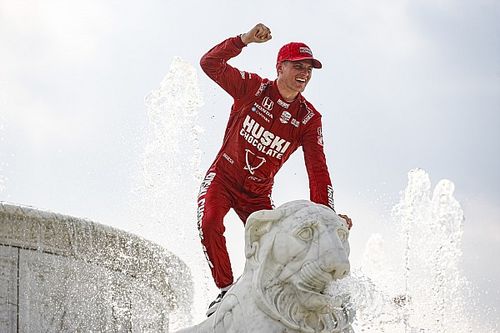Mercedes could delay decision on second 2022 F1 seat until winter
Mercedes may delay making a decision on its second 2022 Formula 1 seat until the winter, as it weighs up whether to retain Valtteri Bottas or take George Russell.

While the German manufacturer hopes to nail down a fresh contract with Lewis Hamilton around the summer break, it is more uncertain about the timing of making a call on its second seat.
Both Bottas and Russell are out of contract at the end of this year, and there have been suggestions that the team could be poised to decide soon.
With Bottas having had some recent struggles, there was even wild speculation that Mercedes could announce signing Russell as early as the British Grand Prix.
But speaking at the French GP, Mercedes boss Toto Wolff said that there was no rush to decide what to do – and that there was a chance the matter could drag on into the winter.
PLUS: Why George Russell is ready to fight for F1 titles
Asked about when there could be news, Wolff said: “Somewhere in the winter I think. But I don't know if it's December, January or February.”
Pushed on if the team would really wait that long, Wolff said: “It is highly possible because we have always been committed and loyal to the drivers. And this is what we're doing.”

Toto Wolff, Team Principal and CEO, Mercedes AMG
Photo by: Steve Etherington / Motorsport Images
Although Bottas has had a fair few disappointments this year, Wolff said that the ball was very much in the Finn’s court about whether or not he could convince Mercedes to keep him.
Asked about what Bottas had to do to stay with Mercedes, Wolff said: “Drive the car fast on a Saturday and Sunday. If he does that, he puts himself in a very good situation in terms of next year.”
Read Also:
Wolff was also clear that the final decision would be based on ultimate performance, and there would no temptation for Mercedes to make the switch purely for a change of line-up.
“That [a fresh impetus] is one of the one of the things that need to be considered? Absolutely. But it's not the main driver,” he said.
“The main driver is consistent performance. Especially in this difficult year, we need two drivers that are racing right there.
“If one is having an off weekend or DNFs, you need the other one to bring it home. And that's why it's always important that both are just on the max of their ability.”
Related video

Previous article
F1 faces "serious problem" over tyre failures, says Aston Martin
Next article
The 'surprise' Mercedes time that puts F1's victory fight back on a knife-edge in France

Mercedes could delay decision on second 2022 F1 seat until winter
The 'surprise' Mercedes time that puts F1's victory fight back on a knife-edge in France
Red Bull led the way after the first two practice sessions for the 2021 French Grand Prix, but only just ahead of Mercedes. There was all the usual practice skulduggery complicating the performance picture, but one aspect seen at the world champion squad gave it a ‘surprise’ lift, as it looks to leave its street-circuit struggles firmly in the past
How Ferrari got its F1 recovery plan working
After its worst campaign in 40 years, the famous Italian team had to bounce back in 2021 – and it appears to be delivering. Although it concedes the pole positions in Monaco and Baku paint a somewhat misleading picture of its competitiveness, the team is heading into the 2022 rules revamp on much stronger footing to go for wins again
The joy that exposes F1’s key weakness
Long-awaited wins for ex-Formula 1 drivers Marcus Ericsson and Kevin Magnussen in IndyCar and IMSA last weekend gave F1 a reminder of what it is missing. But with the new rules aimed at levelling the playing field, there’s renewed optimism that more drivers can have a rewarding result when their day of days comes
The figures Red Bull and Mercedes can't afford to see again in F1 2021
OPINION: An interloper squad got amongst the title contenders during Formula 1’s street-circuit mini-break, where Red Bull left with the points lead in both championships. But, as the campaign heads back to purpose-built venues once again, how the drivers of the two top teams compare in one crucial area will be a major factor in deciding which squad stays in or retakes the top spot
Why Alfa's boss is ready for the task of securing a stronger F1 future
Two tenth places in recent races have lifted Alfa Romeo to the head of Formula 1's 'Class C' battle in 2021, but longer-term the Swiss-based squad has far loftier ambitions. With the new 2022 rules set to level out the playing field, team boss Frederic Vasseur has good reason to be optimistic, as he explained to Autosport in an exclusive interview
How Barnard’s revolutionary McLaren transformed F1 car construction
The MP4/1 was pioneering by choice, but a McLaren by chance. STUART CODLING relates the tangled (carbonfibre) weaves which led to the creation of one of motor racing’s defining cars
Why the end is nigh for F1’s most dependable design tool
Windtunnel work forms the bedrock of aerodynamic development in Formula 1. But as PAT SYMONDS explains, advances in virtual research are signalling the end of these expensive and complicated relics
Why polarising Mosley’s legacy amounts to far more than tabloid rumour
The newspapers, naturally, lingered over Max Mosley’s tainted family history and niche sexual practices. But this is to trivialise the legacy of a big beast of motor racing politics. STUART CODLING weighs the life of a man whose work for safety on both road and track has saved hundreds of thousands of lives, but whose penchant for cruelty remains problematic and polarising



































